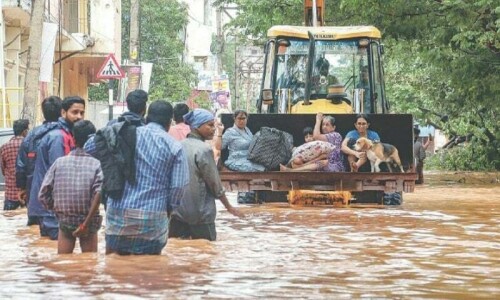The death toll from Cyclone Fengal’s fierce push through Sri Lanka and southern India reached 20 on Monday as downpours and flooding followed the storm’s wake after its winds calmed.
Fengal made landfall in India’s Tamil Nadu state on Saturday, bringing the highest 24-hour rainfall seen in 30 years to nearby Puducherry, before weakening to a normal low-pressure weather system by Monday morning.
More deaths were reported in Sri Lanka after Fengal skirted the island nation on Friday bringing intense rains that triggered landslides.
Sri Lanka’s disaster management agency said a total of 17 people had been killed in the country while nearly 470,000 others were taking shelter in temporary relief camps.
India recorded three deaths from electrocution as a result of the storm, Tamil Nadu disaster management minister KKSSR Ramachandran told reporters late Saturday.
He did not give further details on what caused the deaths, adding that damage from the cyclone was otherwise “minimal”.
India’s disaster agency was also attempting to rescue a family of seven in the state feared trapped by a landslide, local media reports said on Monday.
Roads were flooded and schools were shut in parts of southern India with weather officials on Monday warning that there remained a risk of flash flooding.
Puducherry, a former French colony on India’s southern coast, received its highest 24-hour rainfall in 30 years after Fengal made landfall nearby, India’s weather department said.
Cyclones — the equivalent of hurricanes in the North Atlantic or typhoons in the northwestern Pacific — are a regular and deadly menace in the northern Indian Ocean.
But scientists warn that storms are becoming more powerful as the world heats up due to climate change driven by burning fossil fuels.
Warmer ocean surfaces release more water vapour, which provides additional energy for storms, strengthening winds.
A warming atmosphere also allows them to hold more water, boosting rainfall. But better forecasting and more effective evacuation planning have dramatically reduced death tolls.















































Dear visitor, the comments section is undergoing an overhaul and will return soon.